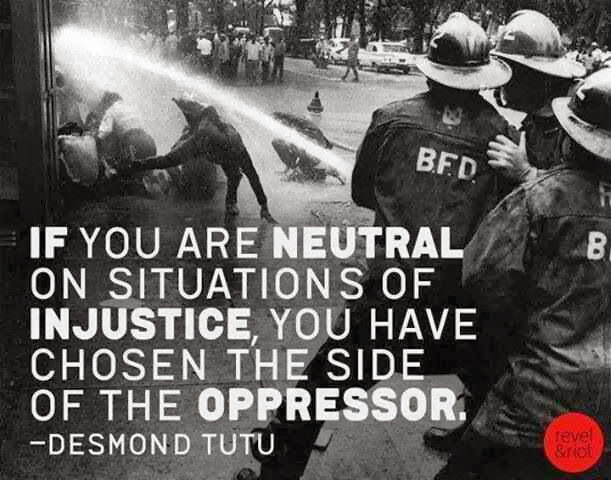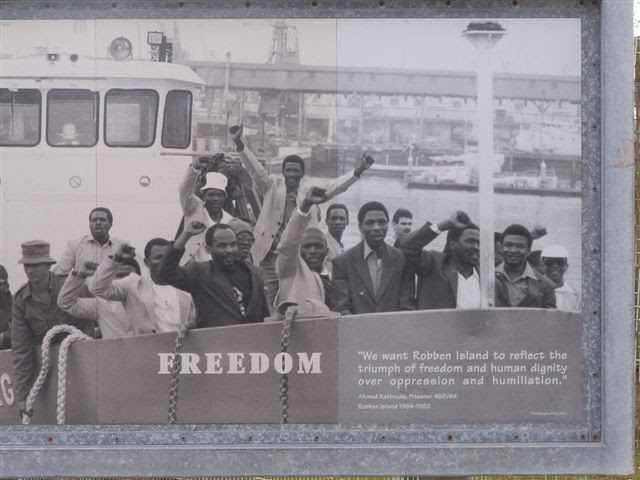
How to beat Goliath
Because size doesn’t matter
I have formulated 6 rules which I call David’s rules. These are for anyone facing the big one ...

As I write this, it looks like South Africa is in meltdown. There is widespread looting in the streets and a total breakdown of all law enforcement machinery. The most iconic thing, which really hit the proverbial nail on its stupid head was a video of a South African policeman in uniform, in Durban, carrying away in his official police car, the goods he looted from a store. I mean, at least he could have called an Uber for it, eh! I can’t even begin to imagine what can demonstrate better than this video, what has happened to South Africa. My apologies for the wrong phrase. I should have said, “What has been allowed to happen – not – what has happened.” That is the brutal, harsh, bitter fact. Whatever we are seeing today and whatever it portends for the future is what has been deliberately, coldbloodedly, and cynically allowed to happen to a beautiful nation which was born with so many dreams for a future that promised so much goodness for everyone who called himself or herself, South African. It is a good thing that Madiba is dead. Otherwise, what is happening today would have killed him as surely as a bullet in the head. Ditto for Ahmed Kathrada. That magnificent pair of friends, who lived in the same cell in Robben Island prison and bore hardship and torture thanks to the strength of their dream. A dream that was shared by all those who worked, fought, agitated, even lost their lives, to make that dream come true. Was that dream to see a policeman in uniform, looting a store and carrying away the loot in his official police car? https://youtu.be/BSrF6OIKtBM That’s the video that I saw.
What happened, South Africa and South Africans? Only you can say what happened. Only you can change it. But it is getting more and more difficult day by day.

In my many visits to this beautiful country, South Africa, one of the things that I am always struck by is the proliferation of violent crime. The situation seems to have reached truly alarming proportions where people have lost all sense of safety and are in a state of siege. The situation appears to be at a stage that if it is not tackled effectively and urgently it can easily result in a total meltdown of civilized society. The most ‘alarming’ thing in my view is the ‘acceptance’ of the situation that I heard in the tones and words of the many people, who seem to be getting resigned to the situation. I remind myself that in the presence of injustice, the truly alarming sign is the lack of will to fight against the injustice. That is the truest guarantee that injustice will prevail in the land. As long as there are those who fight against injustice, those who perpetrate it, need to fear the consequences of their actions. When that fight stops, then the criminals will rule the world.

South African people fought against oppression and though it took 50 years and the lives of countless martyrs, South Africa is free. For as long as the fight continues, there is hope for those who believe in justice and freedom. This shows us that the first thing to do in the fight against crime in South Africa is for the people who are law abiding citizens, not to lose hope and never to accept the current status quo. It is their duty to continue to look for ways to make South African society a place that the criminal fears and not the law-abiding citizen. Law enforcement has a simple philosophy: Make the criminal pay, not the crime. Until crime pays, criminals will thrive. When criminals start to pay, crime will end. That’s it. Make the criminal pay. We talk about crime prevention but sometimes forget that the best protection against crime is not a fancy alarm system or barbed wire fences and guard dogs, but effective and fast law enforcement. Raise the stakes for the criminal. When criminals start to feel that they can’t get away with the crime, they will not take the risk. What a person makes, a person can break. That applies to any security system. But it also applies to any criminal strategy. No matter how clever the criminal is, if the police can catch him and prosecute him in a court that will sentence justly and quickly, crime will not be the game it currently is, in South Africa.
Multi-pronged accelerated Strategy
I am not going into a detailed analysis of the causes of violent crime. I believe these reasons are clear to all those who know the history of this beautiful country and all those who fought and laid down their lives to create a land where people can live with dignity, in freedom. The martyrs of the freedom struggle did not die to create a situation where the normal, law-abiding person must still fear for his or her life and dignity. To change this situation is the responsibility of those who inherited a free South Africa. In my view crime in South Africa must be tackled at multiple levels. The objective must be to remove or reduce the ‘need’ for crime and make it as difficult as possible to commit it. This must be supported by very tough policing which raises the stake for those who commit crimes. And finally, a judicial system that is swift in its disposal of cases so that criminals pay a heavy price for their crimes. It must be remembered that the purpose of law is to make it safe and comfortable for the law-abiding citizen to live in society. Not to make it safe for the criminal to commit crimes and then to hide behind the cloak of human rights, and mercy. It was the criminal’s choice to breach good faith and violate the human rights of someone else. He didn’t show mercy for the person he looted, raped, and killed. For this he must pay a price that is not only ‘fair’ in the context of the crime that he committed but becomes a deterrent for any aspiring criminals who may seek to emulate this ‘easy’ way to earn a living by preying on people. He must be paid back in his own coin.
1. Partner with Companies to alleviate poverty and create employment
It is time to stop talking about the historical reasons for discrimination and poverty in South Africa. The leaders and elites of free South Africa have had enough time to change all that. Did they do it? Let us see how we can make a difference today. Poverty breeds crime. It is not that rich people are intrinsically honest but that if people are extremely poor, then respecting the life and property of others becomes more an academic argument that is easily lost sight of in the search to fill the belly. Not only is it necessary for the government to be truly concerned with doing all it can, to alleviate poverty but citizens must get involved in the process as well. A very successful model that has been adopted in India voluntarily by some corporate organizations is to adopt villages. This means that the company pays for schools, hospitals, cheap housing, roads, sanitation, public toilets and all welfare civil work as well as to create employment opportunities for the people. Some companies have also entered the area of micro-credit and entrepreneurship development. They work to introduce better farming methods, seeds, fertilizers and so on. The government allows the company to deduct some, or all the expenses incurred from its taxes. These are all hugely empowering programs and since companies are compensated for what they spend there is an eagerness to contribute. South Africans may like to try this method. It will be easier and more impactful because the numbers are far less than in India. Just needs the will to do it.
2. Police Training & Citizen Partnership
Once again, I draw on the Indian example because it parallels the South African one. In some ways, the Indian situation is more complicated, and the forces of corruption are more entrenched. However mercifully violent crime is still a rarity in India and holdups and robberies South Africa style are seen mostly on the screen in Bollywood movies. The way the Founders of the Nation tackled this was by setting up an elite officer cadre called the IPS (Indian Police Service). Cadets are recruited based on a very tough examination at the all-India level (called the Union Public Service Commission exam) that allows successful candidates to enter the bureaucracy in different ‘Services’ like the Indian Administrative Service (IAS), Indian Police Service (IPS), Indian Foreign Service (IFS), Indian Audit & Accounts Service (IAAS) and so on. The minimum qualification to appear for the examination is a graduate degree. Most applicants are postgraduates. The written exam which is conducted anonymously is number driven. Competition is at least 1/300. Upon successfully passing the exam, the candidate appears for a personal interview before a panel of serving and retired Civil Service Officers from the different Services and is then assigned to one of the Services.
For those who are selected for the Indian Police Service, he or she enrolls into an intensive 2-year training program consisting of both academic studies in the different Service Academies (for the different services) and field training in real-life situations. At the end of that period, they formally enter the Indian Police Service. These officers are supposed to be of higher quality and more dedicated and committed than the rank and file that is recruited apart from the UPSC exam route. I say, ‘supposed to be’ because this is not always the case, but the system itself is an excellent one. I suggest that a similar system be created for the South African Police where highly qualified young people are recruited into a fast-track officer cadre and then intensively trained to become career service professionals. The foundation of this training must be inculcation of ethics and values above else. When these officers take charge, they will change the face of policing.
Simultaneously with training the officer cadre it is essential to start a Police-Public Network where citizens become the eyes and ears of the police and partner with them to solve crime. There must be frequent interaction between police and the public in informal settings to build bridges and create an atmosphere of mutual trust. Religious leaders must take a lead role in this and interact with local police officers as a part of their religious event calendars. If enough awareness and openness is created, then it makes it difficult for police officers to be corrupt or to support criminals.
In a country with such a huge crime problem, it was very interesting to note that during the World Cup, crime came to a halt, even though people expected it to peak. Maybe it shows that even criminals are patriotic enough to be concerned about the public image of their country. Or maybe it shows that there is a very deep and powerful nexus which runs the show. Take your pick or think of your own reason for this fact.
3. Education: Moral and ethical code of behavior
The third element of the strategy to fight crime is to work on the minds of the young ones by introducing and strengthening their code of moral and ethical behavior. Ethics and morals are taught in the home and in primary school. Children listen with their eyes. They don’t care what you say until they see what you do. Parents must be roped into whatever is planned in the way of ethical and moral education and it must be experiential and not classroom lectures. Lectures are the worst way to teach ethics and morals. The key is to help them see the value of morals and ethics in their own lives. For this, apart from theoretical instruction it is very useful to have an exchange program where children from neighborhoods of high crime, deprivation, and lack of good parental models visit homes where a strong sense of family, moral and ethical behavior is clearly evident, and the home has a sense of harmony and safety about it. When children see these models and experience love, respect, concern for one another and good manners, they start to see the value of these things and theoretical instruction starts to make meaning. This means getting people living in privileged circumstances to open their homes and doors to those from less privileged situations. Not easy, I admit. But if the wealthy of South Africa recognize that the current situation of the vast economic divide is totally untenable and security compounds and armed guards will not save them from the collapse of society, they will see that the only way out is to share the goodness. Not by handouts, which is another way to entrench dependence and resentment, but by real empowerment with dignity. If there is anything good to come out of the riots and looting that is happening right now, I hope it is that those who refused to face facts until now, will be forced to do so and take the steps needed to ensure that these ugly incidents never happen again.
4. Fast-track Courts to handle criminal offenses
Justice delayed is justice denied. The fourth and last element in the strategy to fight crime is to create fast-track courts to handle criminal offenses. These courts must insist on proper investigation and following of due process of law but must dispose of the cases without any delay. The sentences handed out must be in relation to the seriousness of the crime. More serious the crime, more severe the sentence. The death penalty must be reinstated (even if it is done temporarily) for all convictions of murder and rape. This may seem harsh but in my view the torment and suffering that innocent women undergo when they are raped is far more. As also is the torment of the families of those who are murdered in cold blood for no fault of theirs by criminals who have no concern for either the law of the land or for the lives and dignity of people. As I have said earlier, the purpose of law is to protect the one who abides by it. Not the one who breaks and violates it. The law breaker must feel the pain of breaking the law which he chose to break without any compulsion from anyone. It is his choice. And all choices have a price tag. People commit crimes because they can get away. If they know for certain that they will have to pay a heavy price, crime will stop.
We get what we pay for. What we support, grows. It is essential to ensure therefore that we don’t support lawbreaking and lawless behavior no matter who does it. And to ensure that, the lawbreaker must pay a price that is at least equal to the harm that he has caused. Only then will we be able to create a society that is safe for those who respect the law.
Conclusion
As you can see, the situation of crime in South Africa is complex in terms of the reasons behind it and needs a multi-pronged solution. Some things must be empowered by legislation or ordinances. Others by training and education. The situation is grave enough to warrant all the energy that we can put behind these efforts. I am sure those who are suffering from this, will agree and I pray that they have the energy and influence to create change. All change can only come from within.
Please log in to leave a comment
Loading comments...

I have formulated 6 rules which I call David’s rules. These are for anyone facing the big one ...

One of my friends who comes from ...
I have said this a million times, if I have said it once – the three crimes committed on society with society’s blessing are: Commerci...